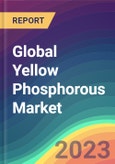The global Yellow Phosphorous market has expanded to reach approximately 2000 thousand tonnes in 2021 and is expected to grow at a healthy CAGR of 5.28% during the forecast period until 2030.The Global Yellow Phosphorous Market Has Expanded to Reach Approximately 2000 Thousand Tonnes in 2021 and is Expected to Grow at a Healthy CAGR of 5.28% During the Forecast Period Until 2030
The primary market driving factor of Yellow Phosphorous is for the production of phosphate-based chemicals like phosphoric acid, phosphorus trichloride, and phosphorus oxychloride. Although, phosphoric acid is the most frequently produced derivative of yellow phosphorous. It is utilized to synthesize derivatives like food grade phosphoric acid, sodium tripolyphosphate, sodium hexametaphosphate, calcium hydrogen peroxide, and industrial grade phosphoric acid. Phosphoric acid’s capacity to supply crops with the necessary nutrients, makes is a suitable component to manufacture fertilizers like diammonium phosphate (DAP), monoammonium phosphate (MAP), NPKs, and SSP. Owing to the robust demand of crops, the demand of phosphoric acid is bound to rise in the upcoming years which will most likely swell the demand of Yellow Phosphorous by 2030.The global Yellow Phosphorous market will most likely reach 3000 thousand tonnes by 2030.
Yellow Phosphorous is a tetramer of phosphorous. It is highly flammable in nature and should be stored in an airtight packaging. This compound appears as a waxy crystalline form with yellow to pale yellow color. This substance is corrosive in nature and should be handled properly. Yellow Phosphorous can be prepared by phosphorous ore by first mixing the ore with silica and carbon reductant, mix, add water/coal, re-mixing, followed by palletization. After this, it is sintered in the vacuum furnace followed by extrusion to result in yellow phosphorous vapor. It is then filtered and cooled to result in the final product.
Based on region, the Asia Pacific region is dominating the Yellow Phosphorous market. In 2021, this region accounted for consumption of approximately 55% of the market. With growing population coupled with fast-pace economic growth, the demand of phosphate-based fertilizers will increase, creating a demand of yellow phosphorous as a raw material. Moreover, China is the leading manufacturer of Yellow Phosphorous, followed by Kazakhstan and Vietnam. China is anticipated to display an upward trajectory in the upcoming years as well.
Based on the end-user industry, the global Yellow Phosphorous market is segregated into Phosphoric Acid, Phosphorus Trichloride, Phosphorus Oxychloride, and Others. Yellow Phosphorous is primarily consumed for manufacturing Phosphoric Acid, accounting for nearly 60% of global consumption in 2021. Although, the demand of Yellow Phosphorous to manufacture Phosphorus Trichloride is yet another impressive application. Phosphoric Acid is majorly consumed preparation of phosphate-based fertilizers like DAP which is widely used in the agriculture sector. Furthermore, phosphorous trichloride is a versatile chemical employed to manufacture a number of goods, including agricultural goods, surfactants and metal extractants, fire retardants, lubricant additives, and plastic stabilizers.
Major players in the production of Global Yellow Phosphorous are Kazphosphate LLC, Jiangyin Chengxing Industrial Group Co., Ltd., Hubei Xingfa Chemicals Group Co., Bayer (Monsanto), Sichuan Province Chuantou Chemical Industry Group Co. Ltd, Duc Giang Chemicals Group (DGC), Jiangsu Chengxing Phosph-Chemicals Co. Ltd, Yunnan Phosphate Fertilizer Industrial Co.,Ltd.(YPFIC), Yuntu Holdings, Yunnan Malong Industry Group Co., Ltd., Chengdu Wintrue Holding, Guizhou Sino-Phos Chemical Co., Ltd., Sichuan Leshan Jinguang Chemicals Co., Ltd., Guizhou Qianneng Tianhe Phosphorus Industry Co., Ltd., Yuntianhua Group Co.,Ltd., and Viet Nam Phosphorus Joint Stock Company.
Years considered for this report:
- Historical Period: 2015- 2021
- Base Year: 2021
- Estimated Year: 2022
- Forecast Period: 2023-2030
Objective of the Study:
- To assess the demand-supply scenario of Yellow Phosphorous which covers production, demand and supply of Yellow Phosphorous market in the globe.
- To analyse and forecast the market size of Yellow Phosphorous
- To classify and forecast Global Yellow Phosphorous market based on end-use and regional distribution.
- To examine competitive developments such as expansions, mergers & acquisitions, etc., of Yellow Phosphorous market in the globe.
The publisher calculated Yellow Phosphorous demand in the globe by analyzing the historical data and demand forecast which was carried out considering the historical extraction and supply and demand of Yellow Phosphorous across the globe. The publisher sourced these values from industry experts, and company representatives and externally validated through analyzing historical sales data of respective manufacturers to arrive at the overall market size. Various secondary sources such as company websites, association reports, annual reports, etc., were also studied by the publisher.
Key Target Audience:
- Yellow Phosphorous manufacturers and other stakeholders
- Organizations, forums and alliances related to Yellow Phosphorous distribution
- Government bodies such as regulating authorities and policy makers
- Market research organizations and consulting companies
Report Scope:
In this report, Global Yellow Phosphorous market has been segmented into following categories, in addition to the industry trends which have also been detailed below:- Market, by End-use: Phosphoric Acid, Phosphorus Trichloride, Phosphorus Oxychloride, and Others
- Market, by Sales Channel: Direct Sale and Indirect Sale
- Market, by Region: North America, Europe, Asia Pacific, Middle East and Africa, and South America.








